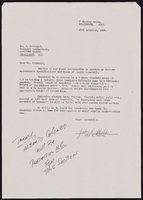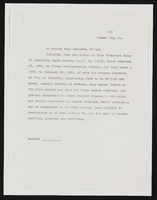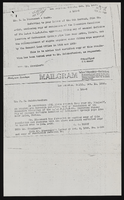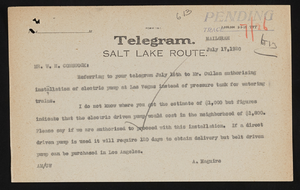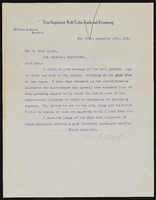Search the Special Collections and Archives Portal
Search Results

Transcript of interview with Alan Clancy by Su Kim Chung, by February 12, 2015
Date
Archival Collection
Description
Alan Clancy grew up in Sydney, Australia, the second son of famous ballroom-dancing parents. He recalls that he had incredible energy as a child, and, therefore, his parents enrolled him in the Shirley de Paul Studio to learn gymnastics, tap, ballet, and jazz. He also became a soprano singer. This training did well for him for as he went through high school he won trophies in sports and participated in musical productions. Eventually, because of a neighboring friend, Kay Dickerson, Alan moved to the Rudas Acrobatic Studio where he received further training and eventually contracted with Tibor Rudas to participate in an entertainment group called “The Las Vegas Dancers”. He was only seventeen when the group boarded a ship for Hong Kong in an enterprise which would eventually allow the dancers to entertain around the world for approximately two and a half years. When the group returned, Alan auditioned for the Tommy Leonetti television show and then for Les Girls in Sydney. Eventually Tibor Rudas appeared with a contract for Alan, when he had just turned twenty-one, to fly to Las Vegas to work in the Folies Bergere at the Tropicana Hotel and Casino. When he arrived in Las Vegas, he was surprised at the size of the city and the hotels but was overly impressed by the neon signs, the showrooms with their nude dancers, the costuming, magnificent sets, the choreography, and the dress of the patrons. He remembers his first night performing in the Folies and the amount of stars in the audience, for example, Elvis Presley, Liberace, and Zsa Zsa Gabor. Alan goes on to describe the many people that he met in Las Vegas, working in various shows, and the many friendships made over the years. However, he eventually became interested in opening his own vintage clothing store, Vintage Madness, near the Strip. He talks about his many customers, the stores around him, his creative ways of acquiring items to sell and the success that was made. Unfortunately, during the middle of one night the store burned to the ground which left Alan devastated. Eventually, however, he purchased three buildings on Fourth Street and opened an art gallery, a coffee shop, and a small stage. His mercantile interest allowed him to leave show business and briefly open a store in Laguna Beach, Southern California. It wasn’t long until Barclay Shaw asked him to work in “Splash” at the Riviera Hotel in Vegas and, therefore, he returned to show business. However, Shaw, his friend, died and so did his mother and he lost interest in his stores, renting them out. Consequently, he returned to live in California and began working with Aids patients. Alan returned to Las Vegas for the reunion of the cast of Folies Bergere and noticed the many changes made in Las Vegas from when he first arrived to perform at the Tropicana Hotel.
Text

Transcript of interview with Sonja Saltman by Barbara Tabach, August 18, 2015
Date
Archival Collection
Description
Included in this oral history are reminiscences of Sonja Saltman's personal non-Jewish heritage in Austria, the importance of her grandmother in her life, and how she recalls becoming part of the Jewish community.
Sonja Saltman is a psychologist and philanthropist in Las Vegas, Nevada. She is executive director and co-founder of the Existential Humanistic Institute, a non-profit organization based in San Francisco, California that offers training in existential-humanistic therapy and theory. In 2003 Sonja and her husband Michael Saltman founded the Saltman Center for Conflict Resolution at the University of Nevada, Las Vegas (UNLV) William S. Boyd School of Law. The Saltman Center is focused on research, teaching, and public service related to "the advanced study of the nature of conflict and how to resolve it." A native of Austria, Sonja Saltman also serves as the Honorary Consul for Austria in Las Vegas. The Saltmans are involved with multiple charitable organizations and initiatives, both locally and abroad. Sonja Saltman has served on the boards of the Anti-Defamation League, Nevada Women's Philanthropy, and the Black Mountain Institute. Projects that the couple has supported include the rebuilding of homes and bridges is Bosnia, and Streetball Hafla, a basketball program to improve relations between Jewish and Arab teenagers in Israel. In 2014 Sonja and Michael Saltman were recognized as Distinguished Nevadans by the Nevada System of Higher Education. Included in this oral history are reminiscences of her personal non-Jewish heritage in Austrian, the importance of her grandmother in her life, and how she recalls becoming part of the Jewish community.
Text

